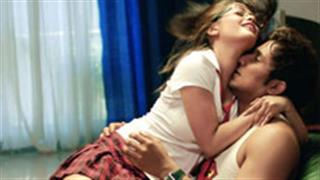Directed by Arjun Bali
Rating: **
The most unreliable thing in life is life itself. This, the protagonist of this sweet little concoction discovers when he wakes up one morning to find that his live-in girlfriend, perfect in manner and devotion, might have to die.
A simple premise based on the theory of déjà vu, Ru-ba-ru derives its slender strength from the conversational tone that the the debutant director brings to the Romantic Comedy....a genre that remains largely over-used and under-sensitized in Hindi cinema, thanks to the florid dialogues, over-the-top performances and incessant flow of nach-gaana.
Here the exuberance of the melodramatic melee that crowds the love in our (e)motion pictures is kept at a believable and urbane decibel. The couple, Randeep (he, the scowling gangster from D) and Shahana Goswami (she, the frowning wife from Rock On) look like a well-matched if strife-torn couple. Their chemistry is certainly not strained.
What strains at our incredulity rather precariously is the second-half when after having seen the death of his love, the man tries to go into those areas of his insensitivity where his relationship erred and suffered.
The two halves of the film are designed to create a moral fable conveying the before-and-after effect of a domesticated apolacypse.
Randeep Hooda confers a casual colloquial sardonicism to the role of a man who's seen tomorrow and would rather enjoy today.
 Shahana Goswami who gets to smile and giggle after frowning and complaining her way through Rock On, provides Hooda with ample scope to refurbish and revise the rituals of romance as they go from dream to a nightmarish reality where we know death is the envitable finale.
Shahana Goswami who gets to smile and giggle after frowning and complaining her way through Rock On, provides Hooda with ample scope to refurbish and revise the rituals of romance as they go from dream to a nightmarish reality where we know death is the envitable finale.Though the plot and its negotiation through a labyrinth of well-charted courtship games are interesting enough, the film finally crumbles under the weight of lightness that comes from portraying love as excessively fleeting fugitive and fragile.
And to believe that man who knows he'll lose his beloved at the end of the day, would go around joking, dancing ang playing the saxophone as the clock ticks away, is stretching the frontiers of romance to the brink of self-parody.
Nonethless the narration done in that wispy twinkle-eyed tone that suggests a deep bond between cinema and Elizabethan poetry (there's even a Hindi version of Shakespeare's Romeo & Juliet staged for all the incurable romantic in the audience) does prod us gently into watching Hooda and Goswami portray a very contemporary couple bustling through a day of seduction and strife, eventually thrown into a situation that shrinks would enjoy analyzing on the couch.
Borrowing generously from films like Peter Howitt's Sliding Doors, Ru-ba-ru makes it a notch above mediocrity for its subtly superior performances and production design. Andre Menezes' skills behind the camera are barely visible. And that's the beauty of catching the characters captured in dying light.
 The second-half is too loose-limbed to qualify as compulsory deja vu. The nadir of storytelling occurs when Hooda and Goswami visit the former's estranged mom (Rati Agnihotri) and stepfather (Jayanth Kroplani). In about ten minutes of playing- time here the director makes every father-son reconciliatory gesture prescribed in the book of social etiquettes.
The second-half is too loose-limbed to qualify as compulsory deja vu. The nadir of storytelling occurs when Hooda and Goswami visit the former's estranged mom (Rati Agnihotri) and stepfather (Jayanth Kroplani). In about ten minutes of playing- time here the director makes every father-son reconciliatory gesture prescribed in the book of social etiquettes.Still, the thai locations and the generous display of stealth in the man-woman relationship redeem what would otherwise have been a film that never crosses the relam of sweet possibilities.
While Hooda and Goswami hold up the lead need with much casual realism, sturdy support comes from Jeneva Talwar as the heroine's best friend and Kulbhushan Kharbanda as a mysterious angel of death driving a taxi.
Ru-ba-ru has a delicious subtext to its romantic surface. Don't leave the task of displaying emotions to a later time.
You may never get there. Ru-ba-ru barely does. It just about makes it through the Sliding Doors.















